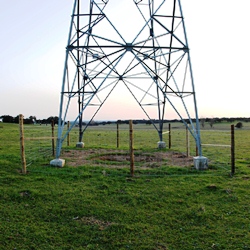The action C10 of LIFE LINES project was featured on UELine on 2-11-2018. Bellow is possible to read the news.
“Creating the “biodiversity islands” under the energy transmission line poles, to function as refugees for small animals, is the purpose of the protocol celebrated between the University of Évora (UÉ) and the National Energy Networks (REN), in the under the project LIFE LINES – Linear Infrastructure Networks with Ecological Solutions.
Coordinated by António Mira, Professor of the Biology Department of the University of Évora, the project aims to evaluate and disseminate measures to mitigate linear infrastructures in various species of fauna and simultaneously promote the creation, along the same, of a Green Infrastructure to support the growth and conservation of the biodiversity of the territory in which it is located, an important corridor of transport and energy between Portugal and Spain.
One of the measures predicted in the protocol now signed with REN, involves the creation of “biodiversity islands” under the energy transmission line poles between Palmela-Évora and Estremoz-Divor lines, constituting themselves “stop and rest sites for species that need refugee,” said the project coordinator.
Linear infrastructures have negative impacts on biodiversity. Of the larger impacts, stand out the ones related to the increase of mortality by roadkill, collision or electrocution, fragmentation and degradation of habitats and the barrier effect to the movement of organisms.
This project, coordinated by the University of Évora in partnership with the universities of Aveiro and Porto, the municipal authorities of Évora and Montemor-o-Novo, Infraestruturas de Portugal SA and the MARCA ADL, represent an investment of 5.5M € 60% of which is financed by the European Commission.”
For further information (in Portuguese): http://www.ueline.uevora.pt/Canais/academia/(item)/25851

